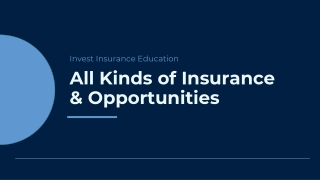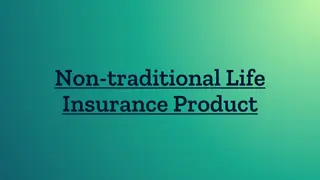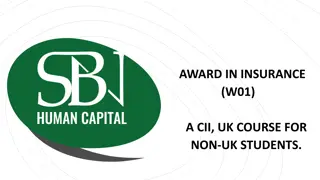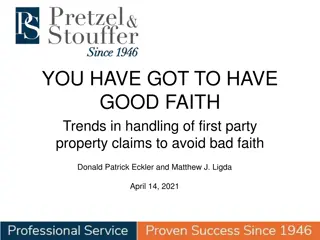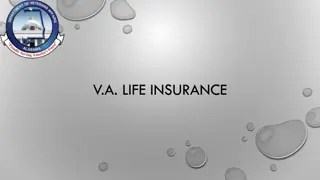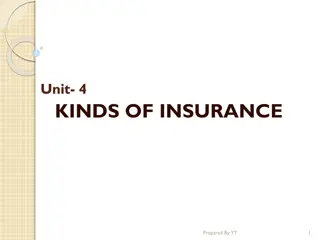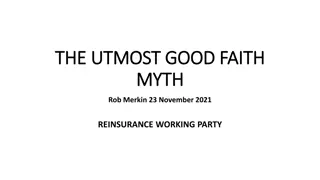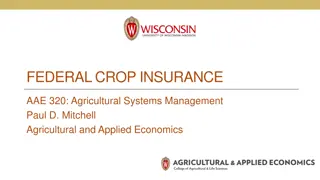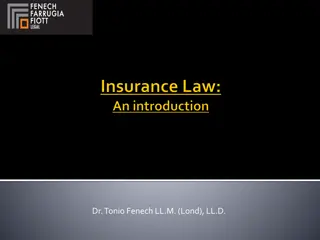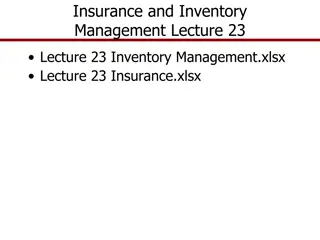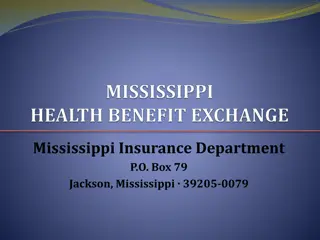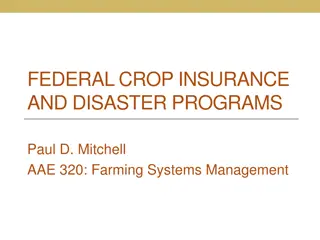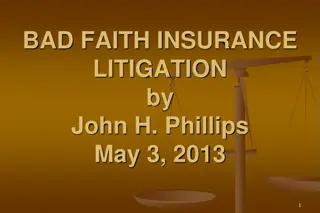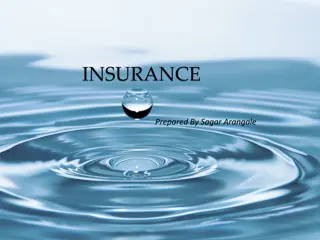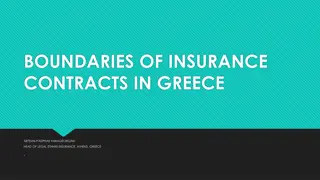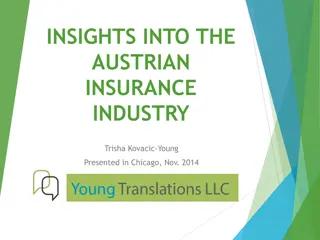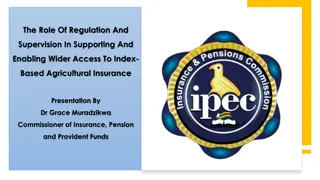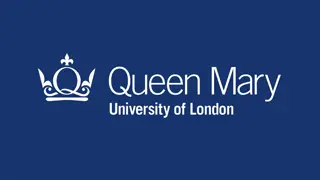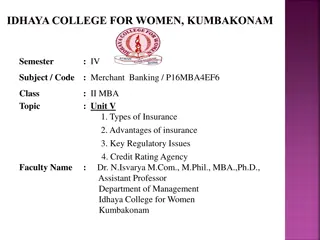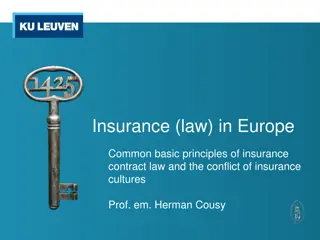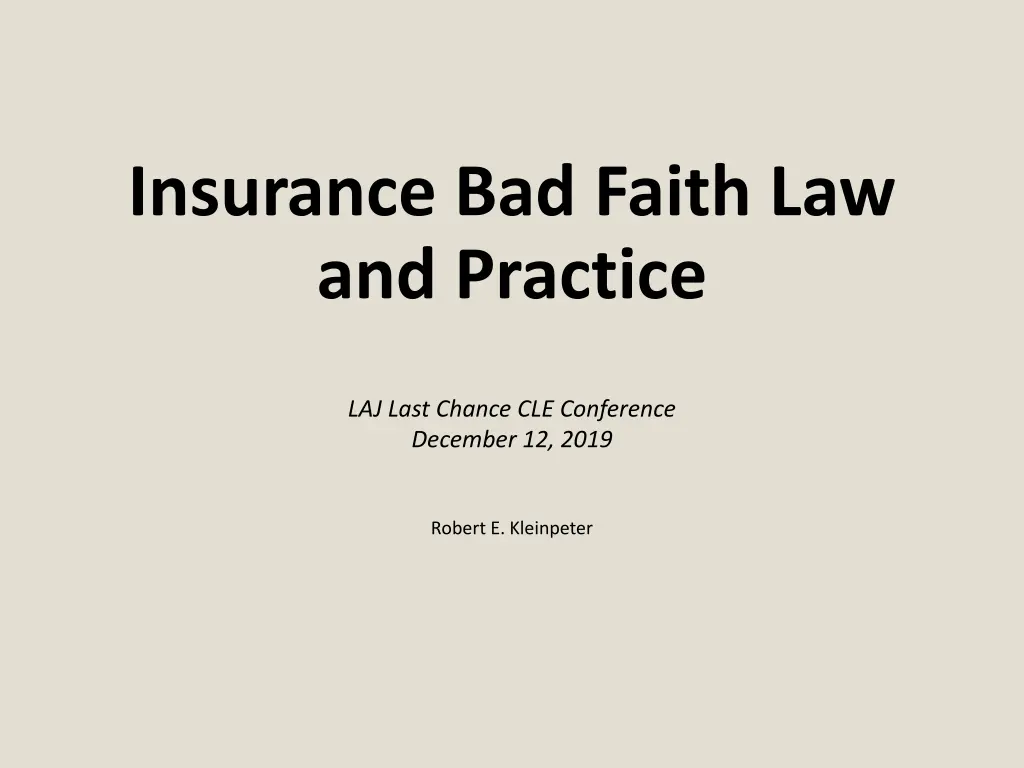
Understanding Insurance Bad Faith Law and Practices at the LAJ Last Chance CLE Conference
Gain insights into insurance bad faith laws and practices discussed at the LAJ Last Chance CLE Conference in December 2019. Explore topics such as arbitrary behavior, good faith disputes, and settlement agreements.
Download Presentation

Please find below an Image/Link to download the presentation.
The content on the website is provided AS IS for your information and personal use only. It may not be sold, licensed, or shared on other websites without obtaining consent from the author. If you encounter any issues during the download, it is possible that the publisher has removed the file from their server.
You are allowed to download the files provided on this website for personal or commercial use, subject to the condition that they are used lawfully. All files are the property of their respective owners.
The content on the website is provided AS IS for your information and personal use only. It may not be sold, licensed, or shared on other websites without obtaining consent from the author.
E N D
Presentation Transcript
Insurance Bad Faith Law and Practice LAJ Last Chance CLE Conference December 12, 2019 Robert E. Kleinpeter
Arbitrary, Capricious, or Without Probable Cause = vexatious = unreasonable La. R.S. 22:1892(A)(1), (2), and (4) (through La. R.S. 22:1892(B)(1)) and La. R.S. 22:1973(B)(5) and (6).
Other Bad Faith Conduct = knowingly La. R.S. 22:1973(B)(1 4).
Good Faith Are there reasonable and legitimate disputes over liability or the extent of the loss?
State of Mind Direct and positive evidence of vexatious refusal is not necessary to impose the statutory penalty.
Satisfactory Proof of Loss Flexible requirement It need not be in any style or form
Unconditional Tender The insurer must pay the undisputed damages by unconditional tender. No duty to tender to third parties.
Disputes Over Insurance Policy Provisions An insurer takes the risk of misinterpreting its policy provisions. Is coverage a factual or legal dispute?
Payment of Written Settlement Agreements 1892(A)(2) applies onlyto an insurer s written settlements with third-party claimants 1973(B)(2) applies to insureds and claimants Both have a 30-day trigger
Oral Settlements in Court Does an oral settlement in Court trigger the insurer s duty to pay? La. Civ. Code art. 3072.
Written Settlement Offers 1892(A)(4) insurer must make a written offer to settle a property damage claim, including a third-party claim, within 30 days of receipt of satisfactory proof of loss
Initiate Loss Adjustment The insurer must take affirmative steps to evaluate the claim Within 14 days of notice on property damage and medical expenses (unless catastrophic loss)
Misrepresentations It s a violation of 1973(B)(1) if the insurer misrepresents pertinent facts or insurance policy provisions relating to coverage.
Bad Faith Failure to Settle Under 1973(A) and (B), an insurer can be liable to its insured for bad faith failure to settle even though it never received a firm (specific) settlement offer.
Assignment Civil Code article 2642 permits the insured defendant (who was sued along with the insurer by the third party) to assign any causes of action to the third party.
Prescription A first-party bad faith claim arises as a result of the insured s contractual relationship with the insurer and it is subject to a 10-year prescriptive period.
Violation of Both Statutes No duplication of damages and penalties Insured may mix and match to recover different statutory damages, penalties, and attorney fees
Summary Judgment Whether to pay a penalty necessarily involves the consideration of factual issues. Rarely appropriate on subjective facts such as intent, motive, malice, knowledge, or good faith.
La. R.S. 22:1892 Statutory Violations Mandatory penalty. 50% penalty on amount due or $1,000.00, whichever is greater Reasonable attorney fees and costs
La. R.S. Statutory Violation 1 22:1973 An insurer shall be liable for any damages sustained as a result of the breach of: Good faith and fair dealing To adjust claims fairly and promptly To make a reasonable effort to settle claims
La. R.S. Statutory Violation 2 22:1973 Consequential damages include pecuniary and non-pecuniary Penalties must be calculated on consequential, not contractual, damages Specific evidence of medical treatment is not required
La. R.S. Statutory Violation 3 22:1973 Discretionary penalty 2 times the sustained damages or $5,000.00, whichever is greater No attorney fees
Attorney Fees 1.Attorney fees belong to the party, not the attorney. Stegall v. Orr Motors of Little Rock, Inc., 49,765(La. App. 2 Cir. 4/15/15), 165 So.3d 264, 267. 2. A contingency fee contract does not impose a ceiling or cap on the amount of fees to be awarded. Smith v. Ouachita Parish School Board, 29,873 (La. App. 2 Cir. 9/24/97), 702 So.2d 727, 738. 3. When stipulated by contract, attorney fees are in the nature of stipulated damages. Maloney v. Oak Builders, Inc., 256 La. 85, 235 So.2d 386, 391. (La. 1970).
(Attorney Fees - Contd) 4. An obligor in bad faith is liable for all damages, foreseeable or not, but attorney fees are not included. Sher v. Lafayette Ins. Co., 2007-2441 (La. 4/8/08), 988 So.2d 186, 201. 5. Factors to be taken into consideration in determining the reasonableness of attorney fees include: (1) the ultimate result obtained; (2) the responsibility incurred; (3) the importance of the litigation; (4) amount of money involved; (5) extent and character of the work performed; (6) legal knowledge, attainment, and skill of the attorneys; (7) number of appearances made; (8) intricacies of the facts involved; (9) diligence and skill of counsel; and (10) the court's own knowledge. State, Dep t of Transp. & Dev. v. Williamson, 597 So.2d 439, 442 (La. 1992).
(Attorney Fees - Contd) 6. A district judge has much discretion in fixing an attorney fee and his award will not be modified on appeal absent a showing of an abuse of that discretion. Kushi Healthcare, L.L.C. v. St. James Behavioral Health Hosp., Inc. 2015-0007 (La. App. 1 Cir. 6/5/15), 174 So.3d 1192, 1199.
Emerging Issues HR No. 220 requested the Louisiana State Law Institute to study and make recommendations concerning payment of claims, penalties, and attorney fees under the Louisiana Insurance Code.

